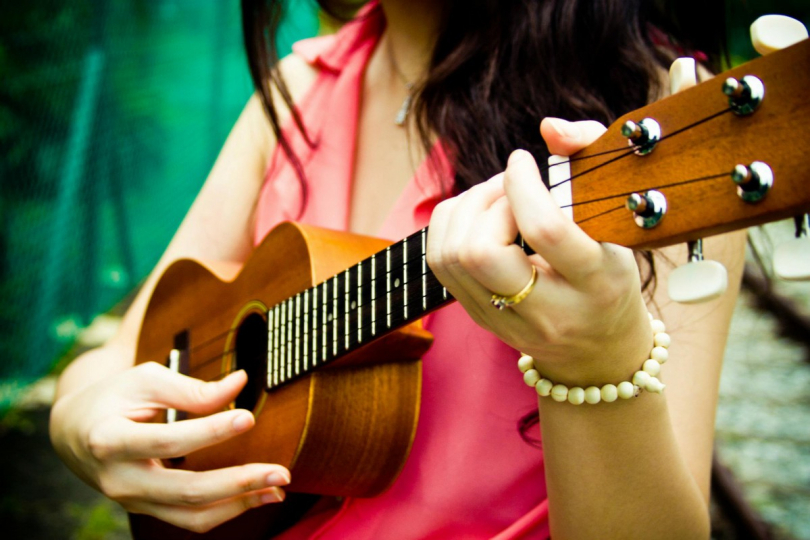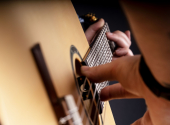
Let’s Choose a Ukulele
Do you want to start playing the ukulele but don't know which one to choose? Do all ukuleles look the same to you and are you confused? Then let's clear things up a bit. We'll give you some advice on how to choose a ukulele, taking you through the four main types and describing their advantages and most common tunings.
Soprano ukulele
- Length: 53 cm
- Scale length: 33 cm
- Tuning: GCEA (most common), ADF#B
- Frets: 12-15
- For: beginners, children, budget watchers, travelers, explorers of new sounds, people with thin fingers
The soprano ukulele is the smallest of the family and is also known as the regular ukulele. Due to its small size, it offers the typical thin, ringing sound that most people will associate with this instrument. Due to the scale length (the distance between the zero fret and the bridge), the frets are fairly close together, and therefore the soprano ukulele is recommended primarily for players with thinner fingers or as a first instrument for children, and it is also ideal as a beginner's ukulele. The nice thing is that it is among the inexpensive ukuleles, so buying one in most cases also won't deprive your family of food for a whole month, and you will probably still have some left over for a small trip on which you can easily bring it along, thanks to its compact size.
Concert ukulele
- Length: 58 cm
- Scale length: 38 cm
- Tuning: GCEA (most common), ADF#B
- Frets: 15-20
- For: players with bigger fingers, advanced players, those who like a fuller tone, performers
The concert ukulele was developed in the 1920s as an improvement on its soprano predecessor. With a more robust body, it offers a deeper and fuller tone, and the spacing between the frets will satisfy players with bigger fingers. The longer scale length causes more string tension, so you can even bend the strings without worrying about detuning the whole instrument. If you're of a larger build, you'll probably find it easier to hold while playing, and thanks to the larger number of frets, you can take a trip along the fretboard here and there towards higher positions. A concert ukulele sounds great even if you replace the lower G string with its octave-lower version. As the name suggests, it's also ideal for public performances, where it shouldn't let you down.
Tenor ukulele
- Length: 66 cm
- Scale length: 43 cm
- Tuning: GCEA
- Frets: 15 +
- For: advanced players, serious players, players with bigger fingers, soloists, those who like a full tone
If you're serious about playing the ukulele, you'll probably find your way to the tenor ukulele eventually. Its tone can already be pretty loud and it offers a larger frequency range. This is thanks to its larger size. But if you don't see your instrument as a mere fashion accessory, you probably won't care. It's ideal for live performances, proven by the fact that it's a favorite of both Eddie Vedder and four-string wizard Jake Shimabukuro. The wider fret spacing allows for proper sound on the higher end, and also in this case, most players will reach for a string pack that includes the G string in its octave-lower version.
Baritone ukulele
- Length: 74 cm
- Scale length: 48 cm
- Tuning: DGBE
- Frets: 19 +
- For: guitar defectors, those who like deeper tones, accompanists, seekers of peculiar instruments
The biggest ukulele, to which the term "small guitar," hated by most players, could be applied with some dignity. It impresses with its sturdy body, rich fret spacing and bassier tone. It's ideal for guitar converts because its tuning matches the four thinnest strings on the guitar. So, you can play with guitarists without transposing and the chords will be familiar (you just have to disregard the E and A strings). However, fans of the classic ukulele sound should rather reach for one of the smaller versions.
Nowadays, there are even bass ukuleles that are tuned like a bass guitar and, with the right amplifier and in the hands of a skilful player, sound just like a bass guitar...
What type(s) of ukulele do you have, or are you looking to buy? Let us know in the comments below.
If you have found an error or typo in the article, please let us know by e-mail info@insounder.org.



